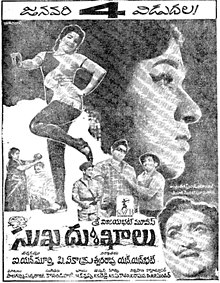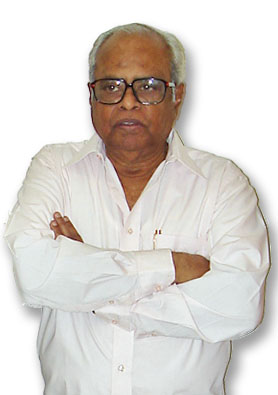
Kailasam Balachandar was an Indian playwright, film director, film producer, screenwriter and actor who worked mainly in the Tamil cinema. He was well known for his distinct film-making style, and the Indian film industry knew him as a master of unconventional themes and hard-hitting contemporary subject matter. Balachander's films are well known for their portrayal of women as bold personalities and central characters. Popularly referred to as Iyakkunar Sigaram, his films are usually centred on unusual or complicated interpersonal relationships and social themes. He started his film career in 1964 as a screenwriter and graduated to a director with Neerkumizhi (1965).
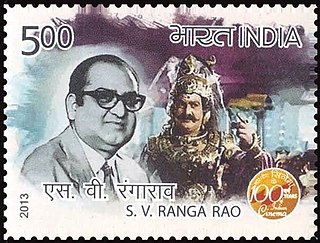
Samarla Venkata Ranga Rao, popularly known as S. V. Ranga Rao and SVR, was an Indian actor and filmmaker who primarily worked in Telugu and Tamil films. He is regarded as one of the finest actors in the history of Indian cinema. He is known by the epithet "Viswa Nata Chakravarthi" and was the earliest known character actor in South Indian cinema to achieve a star status. In a career spanning nearly three decades, Ranga Rao garnered various national and international honours.

Vanisri is an Indian actress known for her works predominantly in Telugu, Tamil, and Kannada films. In a film career spanning 40 years, she has received three Filmfare Awards South, the Nandi Awards and the Tamil Nadu State Film Award.

Chandra Mohan was an Indian actor known for his works predominantly in Telugu films. He won a Filmfare Award South and two Nandi Awards.

Police Police is a 2010 Indian Telugu-language action film directed by Manmohan Challa and produced by Chandu, Mohan Rao Kalyan Patil and Bhaskar Kandagatla. The film stars Prithviraj Sukumaran, Srikanth, Kamalinee Mukherjee and Sanjjanaa in the lead roles. The film was released after a two year delay due to problems with releasing the Tamil version, which was later dropped. The film has been dubbed in Tamil as Kutrappirivu in May 2010. The story revolves around two police officers with different ideologies. The film was released on 9 April 2010.
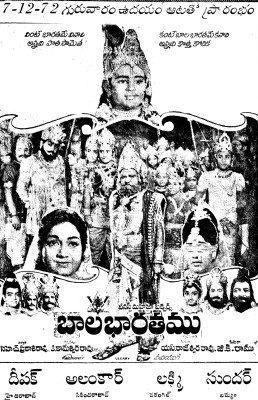
Bala Bharatam is a 1972 Indian Telugu-language Hindu mythological film wherein most of the characters are played by children. The child actors include Baby Sridevi and Master Prabhakar.

Bandhavyalu is a 1968 Telugu film produced and directed by S. V. Ranga Rao. The film is a remake of the Tamil movie Kan Kanda Deivam and also launched the Telugu foray for the South female superstar, Lakshmi.

Haranath was an Indian actor who worked in Telugu films.

Aada Paduchu (transl. Sister) is a 1967 Indian Telugu-language drama film, produced and directed by K. Hemambaradhara Rao under the Subhashini Art Pictures banner. It stars N. T. Rama Rao, Krishna Kumari, Sobhan Babu, Vanisri and Chandrakala, with music composed by T. Chalapathi Rao. The film is a remake of the 1952 Tamil movie En Thangai (1952) which was earlier remade in Hindi in 1959 as Chhoti Bahen and in Kannada in 1967 as Onde Balliya Hoogalu. The film received critical acclaim and was recorded as a Super Hit at the box office.
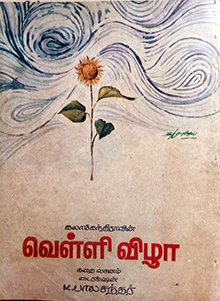
Velli Vizha is a 1972 Indian Tamil-language film, written and directed by K. Balachander. The film stars Gemini Ganesan, Jayanthi, Vanisri and S. Varalakshmi. It was released on 11 August 1972.

Sambarala Rambabu is a 1970 Indian Telugu-language comedy drama film directed by G. V. R. Seshagiri Rao and produced by T. Mohan Rao. It is a remake of K. Balachander's 1968 Tamil film Ethir Neechal, itself based on his stage play of the same name. The film stars Chalam, Sharada and S. V. Ranga Rao.

Major Chandrakanth is a 1966 Indian Tamil-language drama film written and directed by K. Balachander. Based on his play of the same name, the film stars Major Sundarrajan, Nagesh, R. Muthuraman, A. V. M. Rajan and Jayalalithaa. Produced by A. V. Meiyappan of AVM Productions, it revolves around a retired and blind major who gives asylum to a fugitive wanted for committing murder, unaware that the victim was his younger son.

Dasara Bullodu is a 1971 Indian Telugu-language drama film written, directed and produced by V. B. Rajendra Prasad. The film stars Akkineni Nageswara Rao, Vanisri, and Chandrakala, with music composed by K. V. Mahadevan. This film marked Rajendra Prasad's directorial debut.
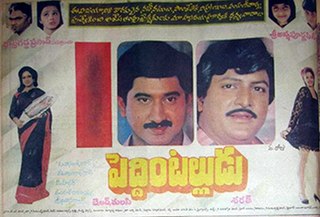
Peddintalludu is a 1991 Indian Telugu-language comedy film directed by Sarath. It stars Suman, Nagma, Mohan Babu, Vanisri with music composed by Raj–Koti. It is produced by T. R. Tulasi under the Sri Annapurna Cine Chitra banner. The film is a remake of the 1962 Hindi film Professor which had earlier been remade in Telugu in 1969 as Bhale Mastaru.
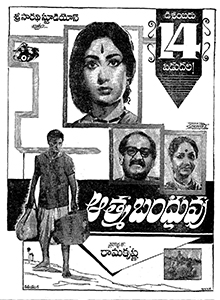
Aathma Bandhuvu is a 1962 Indian Telugu-language drama film, produced by Sarathi Studios and directed by P. S. Ramakrishna Rao. The film stars N. T. Rama Rao and Savitri, with music composed by K. V. Mahadevan. It is a remake of the Tamil-language film Padikkadha Medhai (1960), which itself was a remake of 1953 Bengali-language film Jog Biyog, based on Jog Biyog, a novel of Ashapurna Devi.
Major Chandrakanth is a Tamil-language play written by K. Balachander and staged in the 1960s. It was adapted into a Hindi film titled Oonche Log in 1965, a Tamil namesake film in 1966, a Telugu film titled Sukha Dukhalu in 1968, a Malayalam film titled Karthavyam in 1982, and a Kannada film titled Karune Illada Kanoonu in 1983.

Lakshmi Nivasam is a 1968 Indian Telugu-language drama film directed by V. Madhusudhana Rao and written by Aarudra. It is a remake of the Kannada film Dudde Doddappa (1966). The film stars S. V. Ranga Rao, Anjali Devi, Krishna, Vanisri, Sobhan Babu, Bharathi, V. Nagayya, Ram Mohan, and Padmanabham. It was released on 19 July 1968 and became commercially successful.
Kotipalli Raghava, popularly known as K. Raghava, was an Indian film producer known for his work in Telugu cinema. He began his career in the film industry during the silent film era and went on to become a prominent producer, eventually founding the production company Pratap Arts Productions. Over the course of his career, Raghava produced 30 films across multiple languages, including 28 in Telugu, one film each in Hindi and Tamil.

Jagath Kiladilu is a 1969 Indian Telugu-language crime thriller film directed by I. N. Murthy and produced by P. Ekamreswara Rao and K. Raghava under the banner of Falguna Productions. Featuring Krishna, Vanisri, S. V. Ranga Rao, Gummadi, and Rao Gopal Rao in prominent roles, the film's story and dialogues were penned by noted detective novelist Viswaprasad. Praised for its narrative and performances, the film was a commercial success upon its release.
